
Classical Stuffers
Homegrown symphonic gifts for music lovers
This has been the strongest year in memory for Oregon classical music recordings. Any of these CD would make an excellent buy-local stocking stuffer for Oregon music lovers.
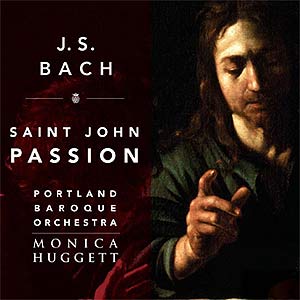
Portland Baroque Orchestra: St. John Passion
Until recently, performances of Bach’s two surviving musical retellings of Jesus’s death often used bloated orchestras, choruses, and industrial strength modern instruments and tunings that violated what scholars believe to be the composer’s intentions, rendering it an impenetrable, oversized musical monument rather than an intimate musical drama. Bach’s score doesn’t specify how many singers and players to use, but long-time PBO music director and veteran English early music violinist Monica Huggett has found that a small chorus and orchestra make the porridge taste just right.
Abetted by the magnificent Portland chorus Cappella Romana and uniformly superb soloists from Canada’s Le Voix Baroque, PBO’s bracing, crisp, urgent and emotionally searing recording is the finest I’ve heard. It makes PBO’s recent partnership with the Oregon Bach Festival all the more welcome.
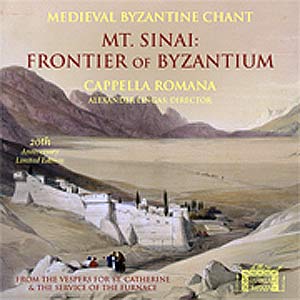
Cappella Romana:
Mt. Sinai: Frontier of Byzantium
In its own concerts, this Portland-based chorus specializes in the gripping, austere music from the Byzantine empire. The group’s two decades of experience, its stentorian performance and the expertise of its London-based director, Portland-born Alexander Lingas, make this a definitive recording of haunting ancient vocal sounds. Drawn from medieval manuscripts preserved in a Greek Orthodox monastery at Mt. Sinai, the chant-like melody and mesmerizing vocal drones never grow tiresome on this splendid recording — a recording that wisely preserves the cathedral echo and resonance listeners would hear live, now or a millennium ago.
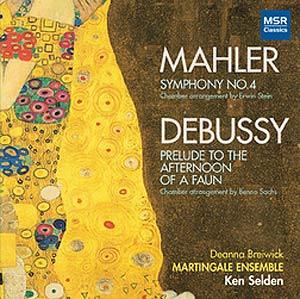
Martingale Ensemble: Mahler: Symphony #4
A chamber orchestra version of a symphony by classical music’s mega-orchestrator may seem as appealing — and as oxymoronic — as fat-free cheese. Yet slim instrumental textures often reveal musical nuances obscured by a plethora of instruments. This 1921 reduction of Mahler’s 1901 original, arranged for a series of concerts facilitated by composer Arnold Schoenberg, makes an appropriate vehicle for this nature-worshiping composer’s symphonic statement.
The 12-member ensemble (featuring some of Portland’s finest musicians, including members of the Oregon Symphony) affords greater transparency for the symphony’s musical textures and evokes its essential atmosphere. Same goes for the other work on the disk, a 1920 arrangement of Claude Debussy’s beguilingly impressionistic, gently revolutionary Prelude to the Afternoon of a Faun.
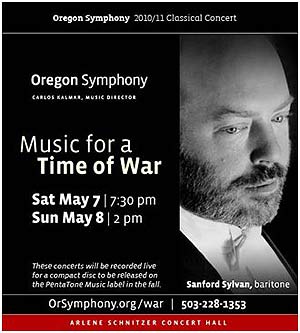
Oregon Symphony: Music for a Time of War
The orchestra’s first album with eighth year music director Carlos Kalmar repeats last May’s Carnegie Hall program that garnered accolades from The New York Times and New Yorker critic Alex Ross.
Although only John Adams’s somber setting of Walt Whitman’s The Wound Dresser (featuring the always-imposing singer Sanford Sylvan) specifically makes martial allusions, the ferocious, ominous mood of rarely heard works by Benjamin Britten (Sinfonia da Requiem) and Ralph Vaughan Williams (Symphony #4), plus Charles Ives’s opening American classic, The Unanswered Question, evokes the violence and anguish of our own era’s conflicts. Like the Carnegie triumph, this CD’s blistering, committed, sharply etched performances should show the rest of the world just how far the orchestra has raised its game since Kalmar’s arrival. This is certainly one of the year’s most compelling classical recordings.
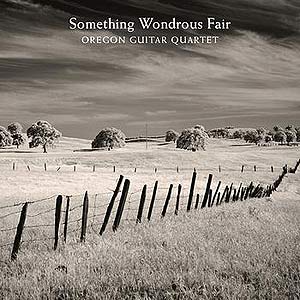
Oregon Guitar Quartet: Something Wondrous Fair; Realizations
This fab foursome of award-winning Northwest classical solo fretboard masters — award-winning composer Bryan Johanson, fellow Portland State University profs David Franzen and Jesse McCann, as well as Portland Community College prof John Mery — released two splendid albums in the past year.
Wondrous Fair, comprising Johanson’s ingenious original arrangements of American folk music from blues to ballads to fiddle tunes to Thelonious Monk’s jazz classic, “Well, You Needn’t,” lives up to its title.
Realizations sets Baroque classics by Bach, Haydn, Vivaldi, Scarlatti and Piccini in arrangements that demonstrate how, in the hands of players like these, a seemingly monochromatic ensemble can almost serve as a little chamber orchestra, adept at elucidating Baroque counterpoint and providing new insights into 18th-century masterworks.
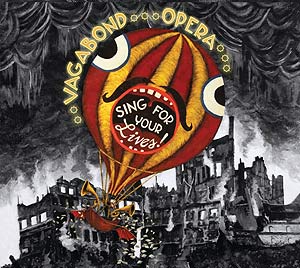
Vagabond Opera: Sing for Your Lives
The Portland-based self-described Balkan Arabic Klezmer-based original absurdist cabaret ensemble’s most cohesive recorded work to date maintains its hallmark variety. But this time, the many elements feel fully assimilated rather than occasionally derivative, maybe because they’re all originals written by the band members, including VO founder/leader and erstwhile opera singer Eric Stern and cellist/chanteuse Ashia Grzesik, a one-time Cirque du Soleil musician who maintains a flourishing solo career. You won’t hear more fun in a classically oriented album this year.